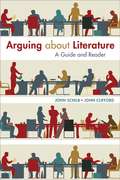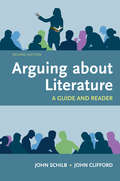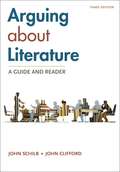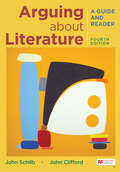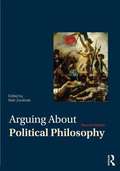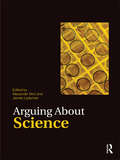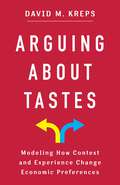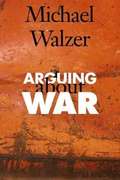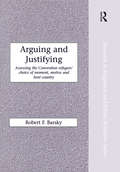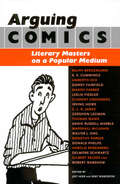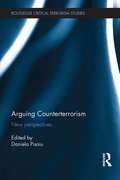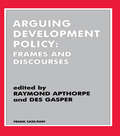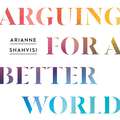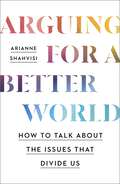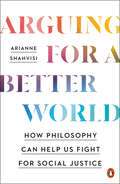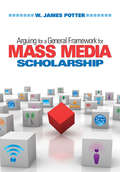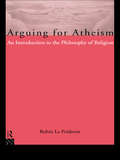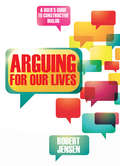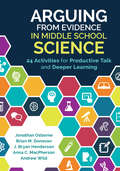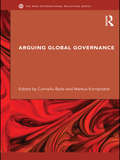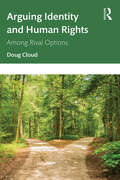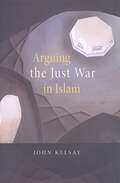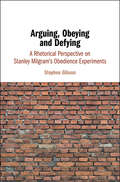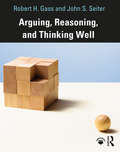- Table View
- List View
Arguing About Literature: A Guide And Reader
by John Schilb John CliffordMore and more, first- year writing courses foreground skills of critical analysis and argumentation. In response, Arguing about Literature hones students' analytical skills through instruction in close critical reading of texts, showing them how to turn their reading into well-supported and rhetorically effective argumentative writing. Two books in one, it combines a guide to reading literature and writing arguments with a compact thematic anthology of stories, poems, plays, essays, and arguments for analysis and research, from the authors of Making Literature Matter.
Arguing About Literature
by John Schilb John CliffordMore and more, first- year writing courses foreground skills of critical analysis and argumentation. In response, Arguing about Literature first hones students analytical skills through instruction in close critical reading of texts; then, it shows them how to turn their reading into well-supported and rhetorically effective argumentative writing. From the authors of the groundbreaking and widely adopted "Making Literature Matter, Arguing about Literature" economically combines two books in one: a concise guide to reading literature and writing arguments, and a compact thematic anthology of stories, poems, plays, arguments, and other kinds of texts for inquiry, analysis and research. The second edition includes even more instruction in the key skills of argumentation, critical reading, and research, while linking literature more directly to the newsworthy current issues of today.
Arguing About Literature: A Guide And Reader
by John Schilb John CliffordArguing about Literature: A Brief Guide hones students’ analytical skills though instruction in close critical reading of texts, showing them how to turn their reading into well-supported and rhetorically effective argumentative and researched writing.
Arguing About Literature: A Guide and Reader
by John Schilb John CliffordArguing about Literature hones your analytical and argumentative writing skills by combining two books in one: a guide to reading literature and writing arguments, and a thematic anthology of literature and essays.
Arguing About Political Philosophy (Second Edition)
by Matt ZwolinskiThis second edition of Arguing About Political Philosophy is the most complete, up-to-date, and interdisciplinary anthology of its kind. Its selections cover both classic philosophical sources such as Hobbes and Rousseau, and contemporary figures such as Robert Nozick and G. A. Cohen. But additional excerpts from economists, psychologists, novelists, and legal theorists help students from diverse intellectual backgrounds to connect with and appreciate the problems and distinctive methodology of political philosophy. This second edition also goes beyond any other anthology on the market in its coverage of traditionally under-represented views such as libertarianism, neo-socialism, feminism, and critical race theory. And it is one of the only anthologies to go beyond A Theory of Justice in its coverage of the political thought of John Rawls. The volume is divided into 3 parts - Foundational Concepts; Government, the Economy and Morality; and Applied Political Philosophy - covering core arguments and emerging debates in topics like: social contract theory political economy property rights freedom equality immigration global distributive justice The new companion website offers valuable resources for instructors and students alike, including sample quizzes, exams, and writing assignments, extensive study questions for each reading, and an online version of the "What's Your Political Philosophy" self-assessment.
Arguing About Science (Arguing About Philosophy)
by Alexander Bird James LadymanArguing About Science is an outstanding, engaging introduction to the essential topics in philosophy of science, edited by two leading experts in the field. This exciting and innovative anthology contains a selection of classic and contemporary readings that examine a broad range of issues, from classic problems such as scientific reasoning; causation; and scientific realism, to more recent topics such as science and race; forensic science; and the scientific status of medicine. The editors bring together some of the most influential contributions of famous philosophers in the field, including John Stuart Mill and Karl Popper, as well as more recent extracts from philosophers and scientists such as Ian Hacking, Stephen Jay Gould, Bas van Fraassen, Nancy Cartwright, and John Worrall. The anthology is organised into nine clear sections: science, non science and pseudo-science race, gender and science scientific reasoning scientific explanation laws and causation science and medicine probability and forensic science risk, uncertainty and science policy scientific realism and anti-realism. The articles chosen are clear, interesting, and free from unnecessary jargon. The editors provide lucid introductions to each section in which they provide an overview of the debate, as well as suggestions for further reading.
Arguing About Tastes: Modeling How Context and Experience Change Economic Preferences (Kenneth J. Arrow Lecture Series)
by David KrepsMainstream economics considers individual preferences to be fixed and unchanging. Although psychologists and other social scientists explore how tastes are formed, influenced, and evolve, it is not considered “proper” in orthodox economics to do so. Arguing About Tastes makes the case that economists should abandon the principle that preferences are fixed and instead incorporate into their work how context and experience shape individual tastes.David M. Kreps argues that the discipline must account for dynamic personal tastes when it comes to understanding social exchange, emphasizing human resource management and on-the-job behavior. He develops formal models that illustrate the power of intrinsic motivation and show why applying extrinsic incentives can be counterproductive. Kreps weighs the advantages and disadvantages of the principle de gustibus non est disputandum: there is no arguing about tastes. He calls for a new era of economics in which preferences are taken into account—and not for granted.Arguing About Tastes concludes with responses by the distinguished economists Alessandra Casella and Joseph E. Stiglitz and a final reply by Kreps.
Arguing About War
by Michael WalzerMichael Walzer is one of the world's most eminent philosophers on the subject of war and ethics. Now, for the first time since his classic Just and Unjust Wars was published almost three decades ago, this volume brings together his most provocative arguments about contemporary military conflicts and the ethical issues they raise. The essays in the book are divided into three sections. The first deals with issues such as humanitarian intervention, emergency ethics, and terrorism. The second consists of Walzer's responses to particular wars, including the first Gulf War, Kosovo, Afghanistan, and Iraq. And the third presents an essay in which Walzer imagines a future in which war might play a less significant part in our lives. In his introduction, Walzer reveals how his thinking has changed over time. Written during a period of intense debate over the proper use of armed force, this book gets to the heart of difficult problems and argues persuasively for a moral perspective on war.
Arguing and Justifying: Assessing the Convention Refugees' Choice of Moment, Motive and Host Country (Research in Migration and Ethnic Relations Series)
by Robert F. BarskyThis is the first book of its kind to address the crucial issue of why people choose to make Convention refugee claims. It represents a substantial and original contribution primarily to the field of refugee studies but also applicable for a broader readership of political science, international studies, sociology, law, history and women’s studies. Furthermore, it theorizes the problems that face refugees by discussing the perception of the possible host countries. The conclusions of the book bear directly upon contemporary issues in refugee studies that suggest refugees move on the basis of (generally) extreme levels of persecution.
Arguing Comics: Literary Masters on a Popular Medium (Studies in Popular Culture Series)
by Jeet Heer Kent WorcesterWhen Art Spiegelman's Maus—a two-part graphic novel about the Holocaust—won a Pulitzer Prize in 1992, comics scholarship grew increasingly popular and notable. The rise of “serious” comics has generated growing levels of interest as scholars, journalists, and public intellectuals continue to explore the history, aesthetics, and semiotics of the comics medium. Yet those who write about the comics often assume analysis of the medium didn't begin until the cultural studies movement was underway. Arguing Comics: Literary Masters on a Popular Medium brings together nearly two dozen essays by major writers and intellectuals who analyzed, embraced, and even attacked comic strips and comic books in the period between the turn of the century and the 1960s. From e. e. cummings, who championed George Herriman's Krazy Kat, to Irving Howe, who fretted about Harold Gray's Little Orphan Annie, this volume shows that comics have provided a key battleground in the culture wars for over a century. With substantive essays by Umberto Eco, Marshall McLuhan, Leslie Fiedler, Gilbert Seldes, Dorothy Parker, Irving Howe, Delmore Schwartz, and others, this anthology shows how all of these writers took up comics-related topics as a point of entry into wider debates over modern art, cultural standards, daily life, and mass communication. Arguing Comics shows how prominent writers from the Jazz Age and the Depression era to the heyday of the New York Intellectuals in the 1950s thought about comics and, by extension, popular culture as a whole.
Arguing Counterterrorism: New perspectives (Routledge Critical Terrorism Studies)
by Daniela PisoiuThis book offers a multifaceted, analytical account of counterterrorism argumentative speech. Traditionally, existing scholarship in this field of research has taken a selective focus on issues and actors, concentrating mainly on US state discourse after 9/11. However, this approach ignores the fact that there was counterterrorism speech before 9/11, and that there are other countries and other actors who also actively engage in the counterterrorism discursive field, both within and outside of the Western world. Addressing several thematic, chronological and methodological gaps in the current literature, Arguing Counterterrorism offers a dynamic perspective on counterterrorism argumentative speech. Over the course of the volume, the authors tackle the following key issues: first, historical and cultural continuity and change. Second, the phenomenology of counterterrorism speech: its nature, instrumentalisation, implications and interactions between the various actors involved. The third theme is the anatomy of counterterrorism speech; namely its political, cultural and linguistic constitutive elements. Employing a multi-disciplinary framework, the authors explore these issues through a geographically and historically diverse range of case studies, resulting in a book that broadens the perspective of counterterrorism argumentation analysis. This book will be of much interest to students of critical terrorism studies, counterterrorism, discourse analysis, security studies and IR.
Arguing Development Policy: Frames and Discourses
by Des Gasper Raymond ApthorpeThis collection shows how policy discourses in the fields of national and international developments are constructed and operate and how they can be analysed. Dominant discourses screen out certain aspects: they frame' issues to include some matters and typically exclude important others. More generally, different policy discourses construct the world in distinctive ways, through language that requires deconstruction and careful review.
Arguing for a Better World: How to talk about the issues that divide us
by Arianne ShahvisiAn antidote to division: a book that arms you with the ability to build good arguments and find a path through conflict and confusion.Can you be racist to a white person? Does cancel culture exist?Is it ever okay to laugh at jokes that rely on racist, sexist or homophobic stereotypes? Is it sexist to say 'men are trash'?These questions tap into some of today's most divisive issues, and finding an answer can often lead to confusion and resentment.Political and generational divides often dictate how questions such as these are answered, and when asked most people give automatic answers that roughly align with the broader position they believe is right - though many flounder when asked to detail their reasoning. This creates cultural and political tribes, makes people nervous about engaging at all, or leads to the issues to be trivialised or attributed to the excessive sensitivity of 'snowflakes' to 'identity politics'. Arguing for a Better World cuts right to the heart of these tensions, with the aim of demonstrating the importance of rigorous definitions and distinctions, revealing the arguments that break the stalemates, and equipping listeners with the tools to identify and defend their positions. Drawing on Shahvisi's work as a philosopher, and using live controversies, well-known case studies, and personal anecdotes, this audiobook reveals and analyses the power relations that shape our social world, and offers powerful ways to challenge them.(P) 2023 Hodder & Stoughton Limited
Arguing for a Better World: How to talk about the issues that divide us
by Arianne Shahvisi'Brings cooling clarity to the heat of today's culture wars' Priyamvada Gopal, author of Insurgent Empire'Allows us to not only interrogate our own views, but to persuade others using reason and optimism. A must read' Aaron Bastani, author of Fully Automated Luxury CommunismCan white people be victims of racism?Is it sexist to say 'men are trash'?Should we worry about 'cancel culture'?Tired of having the same old arguments? Kicking yourself for not being able to justify your views? Wondering whether individuals can bring about meaningful change?Now imagine that instead of losing another hour of your life in a social media spat or knowing that the only way to make it through lunch was by biting your tongue, you could find a way to talk about injustice - and, just possibly, change someone's mind.Many of us know what we think about inequality, but flounder when asked for our reasoning, leading to a conversational stalemate - especially when faced with a political, generational, or cultural divide. But living in echo chambers blunts our thinking, and if we can't persuade others, we have little hope of collectively bringing about change.In Arguing for a Better World, philosopher Arianne Shahvisi draws on examples from everyday life to show us how to work through a set of thorny moral questions, equipping us to not only identify our positions but to carefully defend them.'Logical, readable, authoritative . . . An everyday manual on how oppression came about, how it works, why it persists, and how to defeat it' Danny Dorling, author of Injustice: Why Social Inequality Still Persists and A Better Politics
Arguing for a Better World: How Philosophy Can Help Us Fight for Social Justice
by Arianne ShahvisiIs it sexist to say that &“men are trash&”? Can white people be victims of racism? Do we bear any individual responsibility for climate change?We&’ve all wrestled with questions like these, whether we&’re shouting at a relative across the dinner table, quarreling with old classmates on social media, or chatting late into the night with friends. Many people give kneejerk answers that roughly align with their broader belief system, but flounder when asked for their reasoning, leading to a conversational stalemate—especially when faced with a political, generational, or cultural divide.The truth is that our answers to these questions almost always rely on unexamined assumptions. In Arguing for a Better World, philosopher Arianne Shahvisi shows us how to work through thorny moral questions by examining their parts in broad daylight, equipping us to not only identify our own positions but to defend them as well. This book demonstrates the relevance of philosophy to our everyday lives, and offers some clear-eyed tools to those who want to learn how to better fight for justice and liberation for all.
Arguing for a General Framework for Mass Media Scholarship
by Dr W. James Potter"Arguing for a General Framework for Mass Media Scholarship challenges scholars and students to consider and reconsider what we know about media and how we think about media. As such, the book provides an important framework for thinking about knowledge—regardless of the discipline… The text provides all of the necessary tools to move the field forward in a way that will increase the rigor of the work being done and augment the overall profile of the discipline." –Dana Mastro, University of Arizona In this groundbreaking book, W. James Potter presents an innovative perspective to media scholars and students who are frustrated with the fragmentation of research findings across so many journals, books, and fields. Arguing for a General Framework for Mass Media Scholarship presents a clear plan for a more efficient way to build knowledge about the mass media so that it can be better organized and made more useful. Key Features Conducts an in-depth analysis of mass media scholarship's four major facets of effects, content, audiences, and organizations Presents a significant shift in conceptualizing media effects and ways research can be conducted to generate more useful knowledge about media influence Develops "narrative line" as a tool to guide analyses about how content decisions are made by producersSynthesizes a system of explanation about why audiences attend to certain messages and how individuals construct meaning from those messagesIncorporates an analysis of mass media organizations to provide greater context of understanding messages and their effects on individuals and macro units in society"The book will play an important role in providing structure to a broad, fragmented discipline. I believe it will, at the very least, create important dialogues about what we now know/understand about areas of mass media, and where we should move as a discipline… This book is clearly a 'call to arms' for mass media scholars to ratchet up the quality of research (and what we know), to see the interconnections within and among strands of scholarship, and to move forward in a more efficient, organized manner. Professor Potter should be commended for this." —Roger Cooper, Ohio University "This book is...that call to action that comes forward every few years, to wake us up and challenge our ways of doing things, not by being radical, but via synthesis... I've been waiting for several years for a book like this." —Sahara Byrne, Cornell University
Arguing for Atheism: An Introduction to the Philosophy of Religion
by Robin Le PoidevinFirst Published in 2004. Routledge is an imprint of Taylor & Francis, an informa company.
Arguing for Our Lives
by Robert JensenWe live in a time when public discourse is more skewed than ever by the propaganda that big money can buy, with trust in the leadership of elected officials at an all-time low. The "news" has degenerated into sensationalist sound bites, and the idea of debate has become a polarized shouting match that precludes any meaningful discussion.It's also a time of anxiety, as we're faced with economic and ecological crises on a global scale, with stakes that seem higher than ever before. In times like these, it's essential that we be able to think and communicate clearly.In this lively primer on critical thinking, Robert Jensen attacks the problems head on and delivers an accessible and engaging book that explains how we can work collectively to enrich our intellectual lives. Drawing on more than two decades of classroom experience and community organizing, Jensen shares strategies on how to challenge "conventional wisdom" in order to courageously confront the crises of our times and offers a framework for channeling our fears and frustrations into productive analysis that can inform constructive action.Jensen connects abstract ideas with the everyday political and spiritual struggles of ordinary people. Free of either academic or political jargon, this book is for anyone struggling to understand our world and contribute to making it a better place.Robert Jensen is a professor in the School of Journalism at the University of Texas at Austin and a founding board member of the Third Coast Activist Resource Center.
Arguing From Evidence in Middle School Science: 24 Activities for Productive Talk and Deeper Learning
by Brian M. Donovan Anna C. MacPherson Andrew J. Wild Jonathan Francis Osborne J. (Joseph) HendersonTeaching your students to think like scientists starts here! If you’ve ever struggled to help students make scientific arguments from evidence, this practical, easy-to-use activity book is for you! Give your students the critical scientific practice today′s science standards require. You’ll discover strategies and activities to effectively engage students in arguments about competing data sets, opposing scientific ideas, applying evidence to support specific claims, and more. 24 ready-to-implement activities drawn from the physical sciences, life sciences, and earth and space sciences help teachers to: Align lessons to the Next Generation Science Standards (NGSS) Engage students in the 8 NGSS science and engineering practices Establish rich, productive classroom discourse Facilitate reading and writing strategies that align to the Common Core State Standards Extend and employ argumentation and modeling strategies Clarify the difference between argumentation and explanation Includes assessment guidance and extension activities. Learn to teach the rational side of science the fun way with this simple and straightforward guide!
Arguing From Evidence in Middle School Science: 24 Activities for Productive Talk and Deeper Learning
by Brian M. Donovan Anna C. MacPherson Andrew J. Wild Jonathan Francis Osborne J. (Joseph) HendersonTeaching your students to think like scientists starts here! If you’ve ever struggled to help students make scientific arguments from evidence, this practical, easy-to-use activity book is for you! Give your students the critical scientific practice today′s science standards require. You’ll discover strategies and activities to effectively engage students in arguments about competing data sets, opposing scientific ideas, applying evidence to support specific claims, and more. 24 ready-to-implement activities drawn from the physical sciences, life sciences, and earth and space sciences help teachers to: Align lessons to the Next Generation Science Standards (NGSS) Engage students in the 8 NGSS science and engineering practices Establish rich, productive classroom discourse Facilitate reading and writing strategies that align to the Common Core State Standards Extend and employ argumentation and modeling strategies Clarify the difference between argumentation and explanation Includes assessment guidance and extension activities. Learn to teach the rational side of science the fun way with this simple and straightforward guide!
Arguing Global Governance: Agency, Lifeworld and Shared Reasoning (New International Relations)
by Corneliu BjolaThis book deals with the questions of how global governance can and ought to effectively address serious global problems, such as financial instability, military conflicts, distributive injustice and increasing concerns of ecological disasters. Providing a unified theoretical framework, the contributors to this volume utilise argumentation research, broadening the concept by identifying the concerns about agency, lifeworld and shared reasoning that different strands of argumentation research have in common. Furthermore, they develop the concept of argumentative deontology in order to make sense of the processes through which argumentation comes to shape global governance. Empirically, the book demonstrates how ideas define actors’ interests, shape their interactions with each other, and ground intentions for collective action. Normatively, it provides an excellent theoretical platform for unveiling less visible manifestations of power in global politics and thereby improves our understandings of the ethical implications of global ordering. Addressing topical issues such as conflict and inter-civilizational dialogue, decision-making in international regimes and organizations, the World Social Forum, the Women’s Environment and Development Organization and Tobin Tax, this book will be of interest to students and scholars of argumentation theory, globalization and global governance
Arguing Identity and Human Rights: Among Rival Options
by Doug Cloud,Arguing Identity and Human Rights poses open questions about how to best argue for human rights, to help us think through the advantages and trade-offs of different rhetorical strategies, identify rival options, and, ultimately, choose our own paths. Modeling a humane approach to human rights argument, this book offers four deep rhetorical analyses of some of the most vexing and fascinating challenges facing human rights arguers in the United States: How do we want to frame difference in human rights advocacy—are we trying to downplay difference or something else? How can we best answer dismissive responses to human rights arguments? Should we portray people in marginalized categories as having “no choice” about their identity, and what would alternatives look like? What are the possibilities and perils of trying to “afflict” audiences with hegemonic identities to persuade them on human rights issues? Offering clear practical and theoretical implications while resisting easy answers, the book provides a concise introduction to the relationship between identity, discourse, and social change. Designed for both theorists and practitioners, for current and aspiring human rights arguers, this insightful text will be of use to students of rhetoric, argumentation, persuasion, and communication studies more generally, as well as human rights, social activism and social change, political science, sociology, and race and gender studies.
Arguing The Just War In Islam
by John Kelsay<P>Jihad, with its many terrifying associations, is a term widely used today, though its meaning is poorly grasped. Few people understand the circumstances requiring a jihad, or "holy" war, or how Islamic militants justify their violent actions within the framework of the religious tradition of Islam. <P>How Islam, with more than one billion followers, interprets jihad and establishes its precepts has become a critical issue for both the Muslim and the non-Muslim world.<P> John Kelsay's timely and important work focuses on jihad of the sword in Islamic thought, history, and culture.<P> Making use of original sources, Kelsay delves into the tradition of shari'a--Islamic jurisprudence and reasoning--and shows how it defines jihad as the Islamic analogue of the Western "just" war. <P>He traces the arguments of thinkers over the centuries who have debated the legitimacy of war through appeals to shari'a reasoning. <P>He brings us up to the present and demonstrates how contemporary Muslims across the political spectrum continue this quest for a realistic ethics of war within the Islamic tradition.<P> Arguing the Just War in Islam provides a systematic account of how Islam's central texts interpret jihad, guiding us through the historical precedents and Quranic sources upon which today's claims to doctrinal truth and legitimate authority are made.<P>In illuminating the broad spectrum of Islam's moral considerations of the just war, Kelsay helps Muslims and non-Muslims alike make sense of the possibilities for future war and peace.
Arguing, Obeying and Defying: A Rhetorical Perspective on Stanley Milgram's Obedience Experiments
by Stephen GibsonStanley Milgram's obedience experiments are among the most influential and controversial scientific studies ever conducted. The experiments are commonly understood to have shown how easily people can be led into harming another person, simply as a result of following orders. Recently, however, Milgram's studies have been subjected to a sustained critique and re-evaluation. This book draws on the vast stock of audio recordings from Milgram's experiments to reveal how these experiments can be understood as occasions for argumentation and rhetoric, rather than showing how passive subjects can be led into simply doing as they are told. In doing so, it reconsiders what we understand by 'obedience' and extends how social psychologists have understood rhetoric itself.
Arguing, Reasoning, and Thinking Well
by Robert Gass John SeiterArguing, Reasoning, and Thinking Well offers an engaging and accessible introduction to argumentation and critical thinking. With a pro-social focus, the volume encourages readers to value civility when engaged in arguing and reasoning. Authors Gass and Seiter, renowned for their friendly writing style, include real-world examples, hypothetical dialogues, and editorial cartoons to invite readers in. The text includes a full chapter devoted to the ethics of argument, as well as content on refutation and formal logic. It is designed for students in argumentation and critical thinking courses in communication, philosophy, and psychology departments, and is suitable for students and general education courses across the curriculum.
